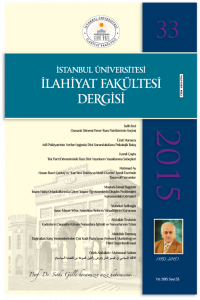Abstract
Genel olarak ibadet
ve buna bağlı olarak namaz, cemaatle namaz ve kadınların cemaate iştiraki
konusundaki fıkhi hükümler, Hz. Peygamber’in farklı dönemlerdeki emir ve
tavsiyeleri dikkate alınarak düzenlenmiştir. Kadınların
ibadetler konusunda fıtratlarından kaynaklanan bazı geçici kısıtlamalar hariç,
erkekler ile arasında fark gözetilmemiştir. Hatta Hz. Peygamber ve Hulefâ-i
Raşidin dönemlerinde beş vakit namazda Mescid-i Nebevide, bayram namazlarında
musallada kadınların, tesesettür ve ihtilata dikkat ederek erkeklerin
gerisindeki saflarda yer aldığına dair muhtelif rivayetler bulunmaktadır. Kadınların
cemaate katılması hususunda Hz. Peygamber’den sonraki dönemlerde fitne vb. gerekçelerle
kadınların cemaate iştirakten alıkonulduğu görülmektedir. Nitekim Hz. Peygamber
dönemi ve sonraki uygulamalardaki farklılıklar mezheplerin görüşlerine de
yansımıştır. Bu
çalışmamızda kadınların mescidlere gitmesi, cemaatle kılınan namazlara iştiraki
ve namazlarının edası ile ilgili fıkhî düzenlemeler ele alınacak; bu minvalde
cemaatle birlikte namaz kılınırken erkeklerin ve kadınların uyması gereken
kurallar rivayetler ışığında değerlendirilecektir.
References
- Kaynak, kaynak
Abstract
Islamic legal rulings with respect to women’s
attendance to the congregational prayers are determined based on the Prophet’s
(s) commendments and recommendations in diverse places and times as well as the
topics of worship, prayer (salat) and congregational prayers. Save some certain
specific regulations due to the distinct nature of women, there is not difference
deemed between men and women in worships. Multiple narrations describe how women
took their places in the Masjid al-Nabi for daily prayers, eid payers, and
funeral prayers during the time of the prophet and rightly guided caliphs with
the condition of being wary of their coverings and standing behind the lines of
men. These narrations confirm that there was an array of lines for men and
women, but not a barrier between them. It seems that in the ages after the
death of prophet women are prevented from attending congregational prayers
based on justifications like degeneration. This difference before and after the
age of the prophet and rightly guided caliphs reflected on the disagreements of
schools of Islamic law regarding the issue. This paper
examines Islamic legal regulations on womes’s attendance to masjids and cogregational
prayers as well as details on their performance of prayers. It will focus on
existing narrations with respect to the regulations of congregational prayers
in a group consisting of men and women together.
References
- Kaynak, kaynak
Details
| Subjects | Religious Studies |
|---|---|
| Journal Section | Articles |
| Authors | |
| Publication Date | April 1, 2016 |
| Published in Issue | Year 2015 Issue: 33 |


